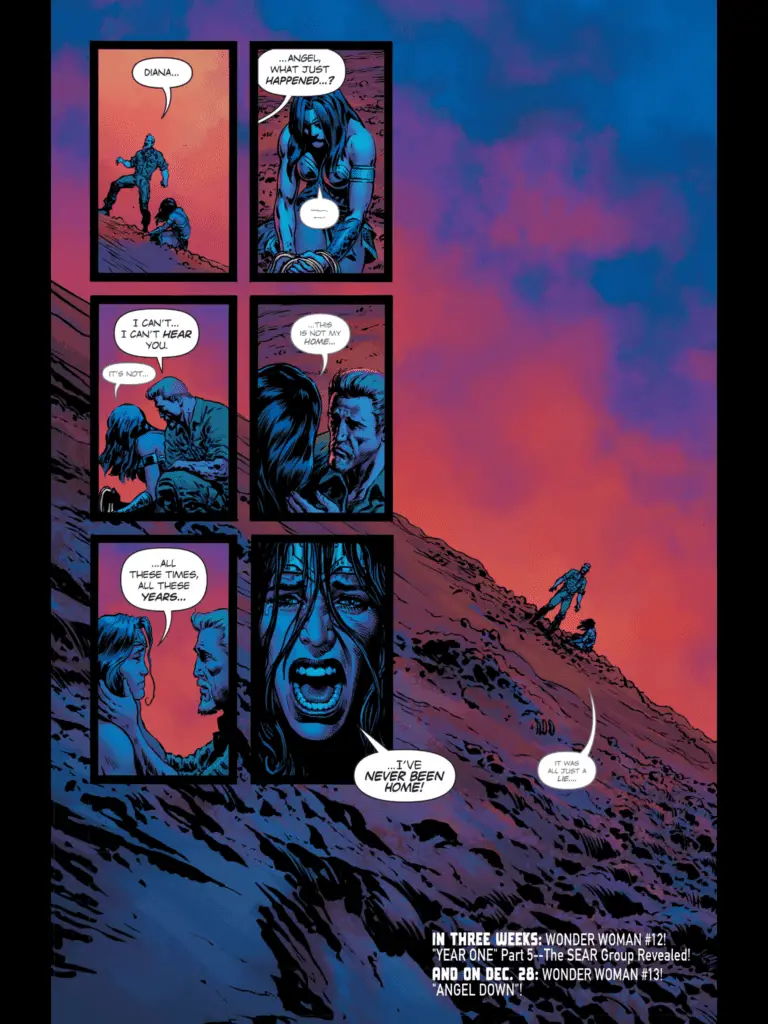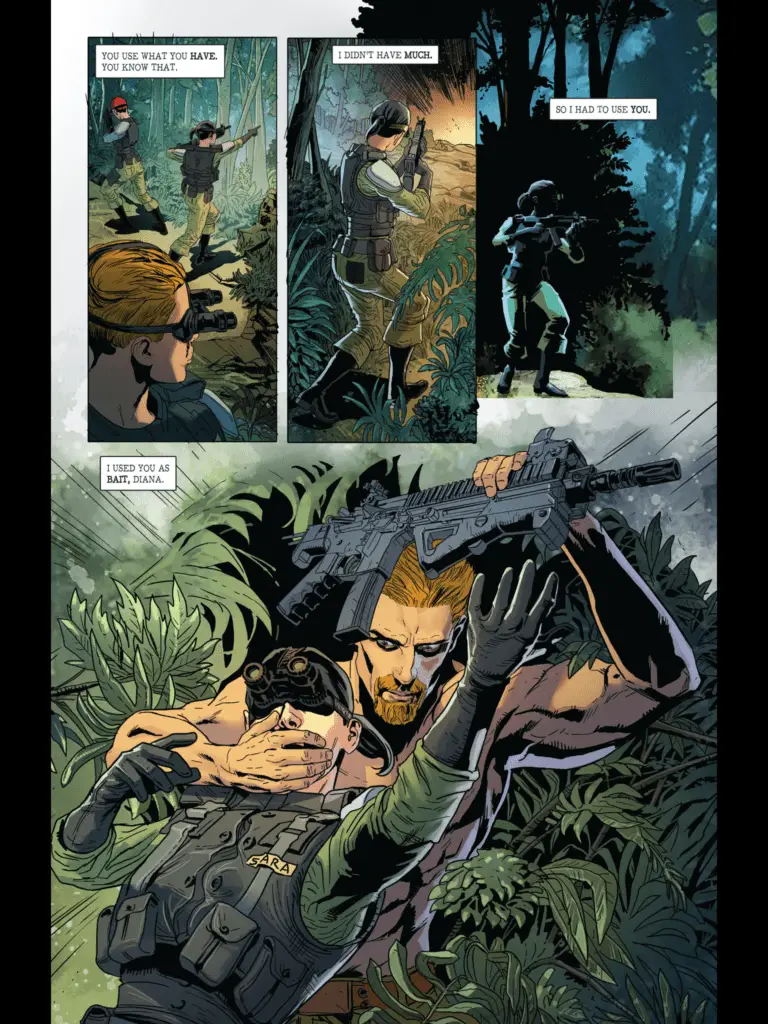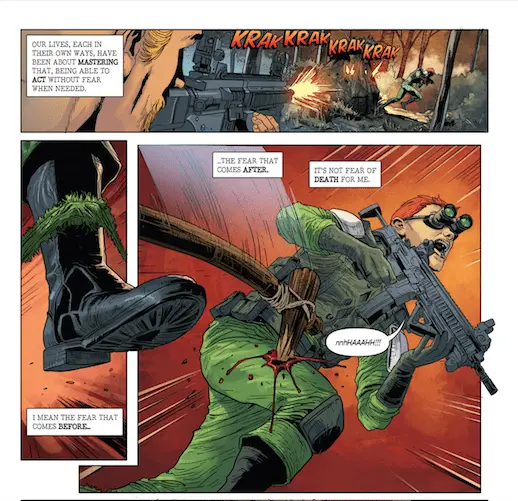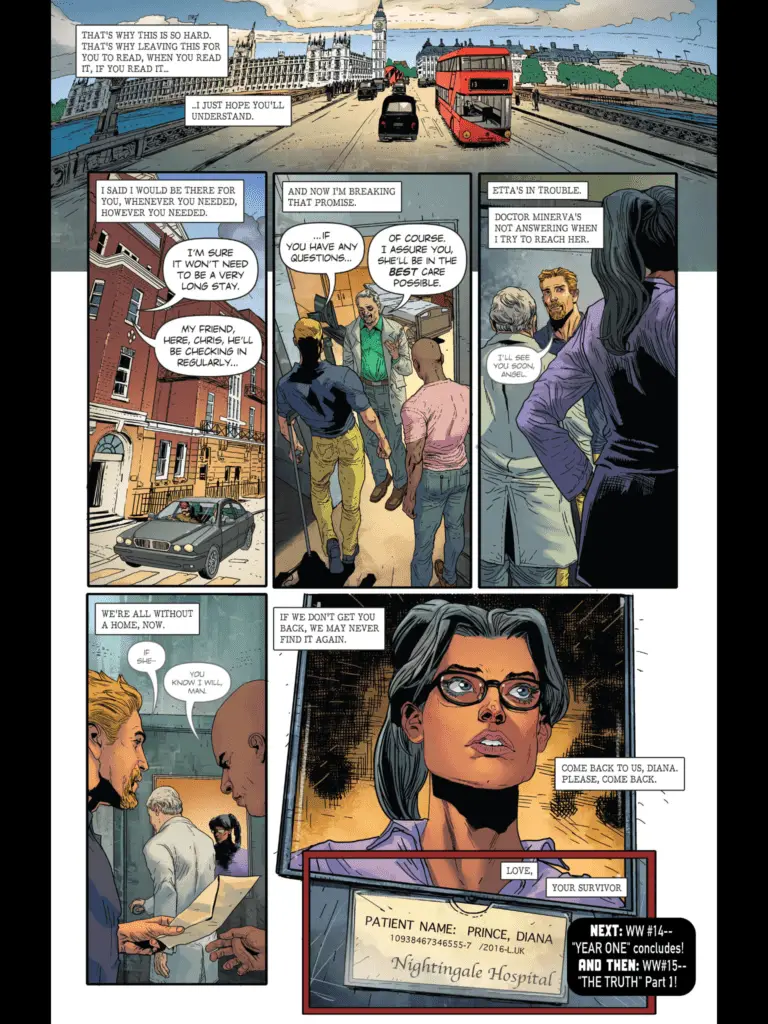Greg Rucka has spent the first twelve issues of his Wonder Woman series building towards the explanation of why things were so wrong in the New 52 take on the character. This has been the primary focus of the appropriately-titled “The Lies” arc, which concluded in issue #11 with the revelation that much of what Diana believed she had experienced—and what we the readers had seen in the New 52 comics themselves—was an out-and-out hallucination/deception perpetrated by villains as-yet-unknown. This was a big moment both for the characters within the comic and for the readers: It is a painful blow to Diana’s psyche to realize that she has been isolated from her friends and family for so long despite all she had thought, and a lot of the continuity and story points that did not make sense in the earlier run can now be explained away as simply not happening (Or at least happening differently than we had seen).
With that kind of hammer blow to end the arc, my expectations were high for the start of the next one. Sadly, those expectations were not met. Technically I suppose you could say that this comic is not the start of the next arc. “Angel Down” is a one-issue standalone, with the next arc (“The Truth”) starting in issue #15. Regardless, it is meant to immediately follow up the huge reveal that closed out the earlier issue, and it fumbles the ball in almost all areas.
The problem I saw right from the beginning is that this issue is Steve Trevor’s story, not Wonder Woman’s. Steve has been a huge part of this series since the beginning, present in both “The Lies” and “Year One”, but until now his role in the story has always been as a supporting character in Diana’s adventure. Here, though, she is barely a character. She spends the issue emotionally fractured after the reveal, vague and unfocused and nearly catatonic, unable to communicate or understand what is happening around her, and reduced to literally following Steve around as he leads her by the hand. In turn, Steve becomes almost a caricature of a hyper-masculine adventure hero. As they are pursued through a jungle by a mercenary team bent on capturing Diana, Steve rigs traps in the trees and stalks them through the woods one-by-one in a sequence reminiscent of the hunting scenes in First Blood.
He even takes off (And rips) his shirt for full MANLINESS effect.
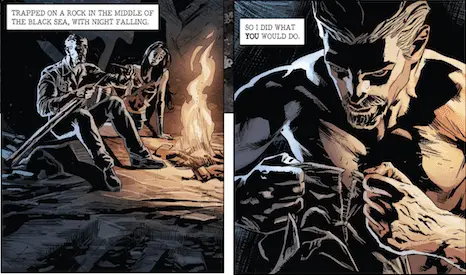
All the while, Steve’s narration is accompanying the action, and we later learn it is from a letter he left for Diana after they have escaped. In the letter he lays out how much she has changed him and improved him and how he wants her in his life because of the man that she makes him. It is all about him, about the effect she has on him. None of it is about her.
Etta Candy is also surprisingly dumped from the issue. When last seen, she was attempting to apprehend Veronica Cale– the villain of at least this immediate arc– and Cale had set her two dogs upon her. Etta’s escape– if she did escape– was not shown, nor were we given any details by implication. In this issue Cale is just back at her office and tells her mercenaries that Etta managed to escape and is on the run, and Steve received a coded message from her warning him that bad people are coming. That is it. Unless the following issues reveal that she did not escape at all and Cale is trying for misinformation, this abrupt skipping of her actual survival is confusing and needlessly obfuscating. It makes us wonder what happened to her without giving us enough information to actually consider the situation and come to any conclusions.
The close of the issue is something I barely known how to process because it is so unexpected and indecipherable. Diana does not recover from her shock and near-catatonia, and so is committed to the Nightingale Hospital mental institution. Yes, you read that correctly, the issue closes with Wonder Woman in a psychiatric facility, with Steve Trevor leaving her there as he goes off to rescue Etta Candy and fight the threat that has apparently reared its head. Steve’s letter narration makes it clear that he himself views this as a betrayal and abandonment and begs her forgiveness.
The issue is…it is strange. It is unlike any of what has come before in this series, and unlike anything else that Greg Rucka has written for this character. Truth be told, when I reached the end I was half-convinced that Rucka had not actually been the author for this issue and I went back to re-read the credits to check if maybe they had brought in a ringer to fill out an issue due to scheduling delays. Nope, he is the credited writer, and so we are left with this as an apparently deliberate work on his part.
It seems to fall into the pitfalls of writing female superheroes that I have seen time and again. The need to make them the sidekicks or supporting characters in their own works, finding ways to put them in the “woman’s place” (i.e. damsel to be protected or rescued) so that they can still have a male hero, of having the story be about their effects on the men around them instead of on themselves. By ending with Diana insensate in a hospital and Steve going off to rescue Etta Candy it sets him up as the hero of the following arc, as the one who will face and defeat the threat, and Wonder Woman’s role is now to inspire him and to get better so that they can be together when he returns. It puts her in the role of trophy and reward instead of character.
Mind you, these same events could be used for a great Wonder Woman story if handled differently. Picture this alternative: When Diana suffers her mental break at the start of this issue we stay with her instead of switching to Steve’s perspective. We get only flashes of what is happening with him (Individual panels of his fight with the mercenaries, his spoken reassurances coming through as vague word balloons) and spend the focus on what is happening with her. What does she see in that panel where she seems to think Steve is a God? What does she mean when she starts whispering Olympian poetry about Strix? What torturous hell is her own mind bringing up for her? If you do this, then Steve gets to be an Action Hero—and I never said Steve does not deserve to be an Action hero. He is a Navy SEAL for Pete’s sake—but it is still her comic.
Then, at the end when she is brought to the hospital, show her recovery as she deals with this traumatizing personal event like anybody else. Have her in therapy—real therapy, not “defeating the magic attack” or whatever will happen to resolve this quickly—as she comes to terms with what she has been through after years of lies and deception. Heal from a wound that does not care how strong your muscles are. They made a point of showing her in an actual hospital, not a Justice League Holding Tank or Suspended Animation Chamber or anything else gimmicky, and with that established they could then begin to show actual psychological treatment.
This pathway could have explored aspects of the Wonder Woman character in a new fashion and could have connected us intimately to her struggles in this issue. Instead…
Honestly, I am disappointed. I am sure that the next arc will have Diana get better and return to her heroic status, I have enough faith in Greg Rucka’s writing to pull that off, but I do not get that feeling from anything that happened in this specific issue. Last month Griffin wrote an article about the problematic issues with the cover of Issue #15, and we seem to be heading into that territory now. If I came into this blank, if I was not already familiar with Rucka’s wide catalogue, then by this issue I would think that Diana was out of this series, only to return for the occasional flashback that Steve has during the rest of the adventure. That is how it reads, as the series switching from being Wonder Woman to being Steve Trevor: Man of Action.
Wonder Woman deserves better than that.
Images courtesy of DC Comics.
Wonder Woman #13
Writer: Greg Rucka
Artist: Renato Guedes
Colors: Romulo Fajardo, Jr.
Cover: Liam Sharp & Brad Anderson


